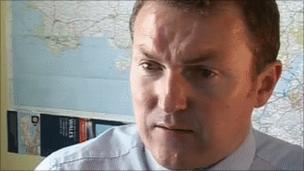Number using loan sharks in Wales up 40% in four years
- Published
The number of people in Wales turning to loan sharks has risen by 40% in the last four years.
The Wales Illegal Money Lending Unit (IMLU) said the figure has jumped from 15,000 to 25,000 since 2007.
The most vulnerable areas include Swansea, Newport, Cardiff, south Wales valleys and the north Wales coast.
Steven Hay, head of the unit, said victims were usually debt-ridden individuals trying to provide for their families.
He said loan sharks targeted vulnerable people like those on low incomes.
Funded by the UK government, but acting on behalf of Wales' 22 councils, the Cardiff-based IMLU has a mix of trading standards officers and former police detectives for its investigations.
Gambling debts
Mr Hay told BBC Wales: "In other parts of the UK, it can exist around drugs, gambling debts or alcohol but we found that more than anything the people in Wales want to provide for their families and sometimes that drives them to go to a loan shark for money."
He said that since its inception in 2007, the unit had identified loan books held by illegal money lenders totalling around £2.5m, and had managed to eradicate around £1m of illegal debt in Wales.
The team has also worked with 1,700 victims and brought 32 people to trial, but the figures are "just the tip of the iceberg", according to Mr Hay and his team.
Claire Smith of Swansea's LASA Credit Union, one of the areas identified as vulnerable by the team, advised people to use their services instead of turning to loan sharks.
She told BBC Wales: "If an illegal money lender is taken out of an area, the issue you have is if somebody has been using that as a source of credit and that credit is taken away, no matter how bad it is, and they think that there is nowhere else to go, another illegal money lender will just come in and take over the patch."

Steven Hay said the figures were just the "tip of the iceberg" and more victims are out there
Mr Hay added that loan sharks targeted communities with vulnerable people, such as families or single people on a low income, often reliant on welfare benefits.
Unlawful imprisonment
Anyone who makes money from lending must have a consumer credit licence from the Office of Fair Trading.
The unit has uncovered many cases of people charged extortionate rates of interest, often with no paperwork.
As well as the threat and use of violence, loan shark criminality can extend to blackmail, money laundering, fraud and unlawful imprisonment or kidnap.
Mr Hay urged those experiencing problems with loan sharks to contact the team's 24- hour hotline on 0300 123 3311.
- Published2 June 2011
- Published16 November 2010
- Published3 November 2010